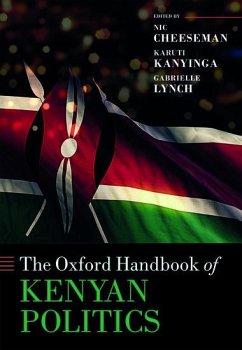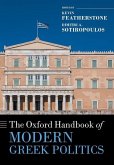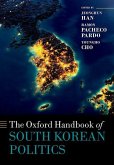The Oxford Handbook of Kenyan Politics
Herausgeber: Cheeseman, Nic; Lynch, Gabrielle; Kanyinga, Karuti
The Oxford Handbook of Kenyan Politics
Herausgeber: Cheeseman, Nic; Lynch, Gabrielle; Kanyinga, Karuti
- Gebundenes Buch
- Merkliste
- Auf die Merkliste
- Bewerten Bewerten
- Teilen
- Produkt teilen
- Produkterinnerung
- Produkterinnerung
The Oxford Handbook of Kenyan Politics provides a comprehensive and comparative overview of the Kenyan political system as well as an insightful account of Kenyan history from 1930 to the present day.
Andere Kunden interessierten sich auch für
![The Oxford Handbook of Scottish Politics The Oxford Handbook of Scottish Politics]() The Oxford Handbook of Scottish Politics224,99 €
The Oxford Handbook of Scottish Politics224,99 €![The Oxford Handbook of Modern Greek Politics The Oxford Handbook of Modern Greek Politics]() The Oxford Handbook of Modern Greek Politics228,99 €
The Oxford Handbook of Modern Greek Politics228,99 €![The Oxford Handbook of Comparative Politics The Oxford Handbook of Comparative Politics]() The Oxford Handbook of Comparative Politics47,99 €
The Oxford Handbook of Comparative Politics47,99 €![The Oxford Handbook of Energy Politics The Oxford Handbook of Energy Politics]() The Oxford Handbook of Energy Politics263,99 €
The Oxford Handbook of Energy Politics263,99 €![The Oxford Handbook of Time and Politics The Oxford Handbook of Time and Politics]() The Oxford Handbook of Time and Politics209,99 €
The Oxford Handbook of Time and Politics209,99 €![The Oxford Handbook of Israeli Politics and Society The Oxford Handbook of Israeli Politics and Society]() The Oxford Handbook of Israeli Politics and Society241,99 €
The Oxford Handbook of Israeli Politics and Society241,99 €![The Oxford Handbook of South Korean Politics The Oxford Handbook of South Korean Politics]() The Oxford Handbook of South Korean Politics231,99 €
The Oxford Handbook of South Korean Politics231,99 €-
-
-
The Oxford Handbook of Kenyan Politics provides a comprehensive and comparative overview of the Kenyan political system as well as an insightful account of Kenyan history from 1930 to the present day.
Hinweis: Dieser Artikel kann nur an eine deutsche Lieferadresse ausgeliefert werden.
Hinweis: Dieser Artikel kann nur an eine deutsche Lieferadresse ausgeliefert werden.
Produktdetails
- Produktdetails
- Verlag: Oxford University Press
- Seitenzahl: 786
- Erscheinungstermin: 25. März 2020
- Englisch
- Abmessung: 249mm x 175mm x 53mm
- Gewicht: 1542g
- ISBN-13: 9780198815693
- ISBN-10: 0198815697
- Artikelnr.: 57824689
- Herstellerkennzeichnung
- Libri GmbH
- Europaallee 1
- 36244 Bad Hersfeld
- gpsr@libri.de
- Verlag: Oxford University Press
- Seitenzahl: 786
- Erscheinungstermin: 25. März 2020
- Englisch
- Abmessung: 249mm x 175mm x 53mm
- Gewicht: 1542g
- ISBN-13: 9780198815693
- ISBN-10: 0198815697
- Artikelnr.: 57824689
- Herstellerkennzeichnung
- Libri GmbH
- Europaallee 1
- 36244 Bad Hersfeld
- gpsr@libri.de
Nic Cheeseman is Professor of Democracy, University of Birmingham and the former Director of the African Studies Centre, Oxford University. He mainly works on democracy, elections, and development and has conducted fieldwork in a range of African countries. His articles have won a number of prizes including the GIGA award for the best article in Comparative Area Studies (2013) and the Frank Cass Award for the best article in Democratization (2015). He is also the author or editor of ten books. He is the founding editor of the Oxford Encyclopaedia of African Politics, and an advisor and writer for Kofi Annan's African Progress Panel. In recognition of this academic and public contribution, the Political Studies Association of the UK awarded him the prestigious Joni Lovenduski Prize for outstanding professional achievement by a midcareer scholar in 2019. His analysis has appeared in the Economist, Le Monde, NY Times, BBC, amongst others. He writes a regular column for the Mail & Guardian. Gabrielle Lynch is Professor of Comparative Politics at the University of Warwick. Her research on Kenya has focused on ethnic identity and politics, elections and democratisation, and transitional justice. She is the author or co-editor of several books and more than 30 articles and book chapters. She is deputy chair of the Review of African Political Economy editorial working group, a member of Democratization's editorial board and Vice-President/Research of the British Institute of Eastern Africa. Gabrielle wrote a twice monthly column for the Saturday Nation (the Saturday edition of Kenya's leading national newspaper) from April 2014 to March 2018 when she stood down alongside 7 other independent columnists in protest at "the loss of editorial independence and media freedom" at the Nation Media Group. From November 2015 to January 2017 she also wrote a twice monthly column for The East African (the main regional newspaper). Karuti Kanyinga is Research Professor of Development Studies, University of Nairobi where he is the current Director of the Institute for Development Studies (IDS), and serves in the Board of Partnership for African Social and Governance Research (PASGR). He has published extensively and is renowned for his contributions to scholarship and knowledge on governance and development in Kenya and Africa in general. He has written extensively on ethnicity and inequality; civil society and development, politics of land rights, and political change. In addition to contribution to scholarship, Karuti served as an advisor to the Kofi Annan Panel of Eminent African Personalities where he advised on monitoring the Kenya National Dialogue and Reconciliation Process (KNDR). He is a frequent commentator on governance and political development in Kenya and Africa in general. He wrote a regular column in Kenya's largest-circulation newspaper, Sunday Nation, and continues to make commentaries on major events.
* Introduction
* 1: Nic Cheeseman, Karuti Kanyinga, and Gabrielle Lynch: The political
economy of Kenya: Community, clientelism, and class
* Part I - The struggle for democracy
* 2: Derek R. Peterson: Colonial rule and the rise of African politics
(1930-1964)
* 3: David W. Throup: Jomo Kenyatta and the creation of the Kenyan
state (1963-1978
* 4: David W. Throup: Daniel arap Moi and one-party rule (1978-1991)
* 5: Raymond Muhula: The limits of multipartyism (1992-2005)
* 6: James D. Long: Civil conflict, power sharing, truth and
reconciliation (2005-2013)
* 7: Collins Odote: The 2013 elections and the peace narrative
(2013-2015)
* 8: Marie-Emmanuelle Pommerolle: The 2017 elections and electoral
(in)justice (2015-2017)
* Part II - Identity politics
* 9: John Lonsdale: Race and ethnicity in colonial Kenya
* 10: Gregory Deacon: The political role of Christian churches
* 11: Ngala Chome: The political role of Islam
* 12: Winnie Mitullah: Gender mainstreaming and the campaign for
equality
* 13: Naomi van Stapele: Youth and masculinity
* 14: Sini Hassinen: Sexual minority rights and activism
* Part III - Political institutions
* 15: Yash Ghai: Constitutions and constitutionalism
* 16: Walter O. Oyugi and Jimmy O. Ochieng: The politics of the
Provincial Administration
* 17: Ken Opalo: The rise and fall of the legislature
* 18: Michelle D'Arcy: Devolution and county government
* Part IV - Civil society, the media and political culture
* 19: Angelique Haugerud, Meghan Ference, and Dillon J. Mahoney:
Satire, social media, and cultures of resistance
* 20: Denis Galava: The role of traditional media
* 21: Michelle Osborn: Chiefs, elders, and traditional authority
* 22: Geoffrey Lugano: Civil society and the state
* 23: Thomas P. Wolf: The science, suspicion and sustainability of
opinion polls
* Part V - Political parties and strategies of mobilisation
* 24: Susanne D. Mueller: High stakes ethnic politics
* 25: Adams Oloo: The weaknesses of political parties
* 26: Sarah Jenkins: Violence as an election strategy
* Part VI - Law and (dis)order
* 27: Irina Ichim: The protection and promotion of human rights
* 28: Ambreena Manji: Land rights and the rule of law
* 29: Musambayi Katumanga: Post-colonial state-military relations
* 30: Abduallahi Boru Halakhe: Police, reform, and counter-terrorism
* 31: Jacob Rasmussen: Gangs and vigilantism
* Part VII - The political economy of development
* 32: John W. Harbeson and Frank Holmquist: The lessons and legacies of
the "Kenya debate''
* 33: Radha Upadhyaya and Edoardo Totolo: The financial sector
* 34: Mai Hassan: The local politics of resource distribution
* 35: Bitange Ndemo and Dennis Aiko: Mobile technology and development
* 36: Jennifer N. Brass: NGOs and public service provision
* 37: Jane N.O. Khayesi: The informal economy and its relationship with
the state
* Part VIII - Kenya and the world
* 38: Michael Chege: The political economy of foreign aid to Kenya
* 39: Njoki Wamai: International relations and the International
Criminal Court
* 40: David M. Anderson: Kenya's war in Somalia
* 41: L. Muthoni Wanyeki: Foreign policy and regional relations
* 42: Samuel M. Makinda: The rise of China in Kenya's foreign relations
* Part IX - Regional politics in the time of devolution
* 43: Patrick O. Asingo: Nyanza: The Odinga dynasty and beyond
* 44: Peris S. Jones: Nairobi: The politics of the capital
* 45: Alex Dyzenhaus: Rift Valley: The struggle for supremacy
* 46: Hassan H. Kochore: North Eastern: From the periphery to the
center
* 47: Dominic Burbidge and Thomas Raji: Central: Self-sufficiency in a
local arena
* 48: Frederick O. Wanyama: Western: Negotiating political
heterogeneity
* 49: Mumo Nzau: Eastern: The dynamics of "bridesmaid politics"
* 50: Hannah Waddilove: The Coast: An elusive political bloc
* 1: Nic Cheeseman, Karuti Kanyinga, and Gabrielle Lynch: The political
economy of Kenya: Community, clientelism, and class
* Part I - The struggle for democracy
* 2: Derek R. Peterson: Colonial rule and the rise of African politics
(1930-1964)
* 3: David W. Throup: Jomo Kenyatta and the creation of the Kenyan
state (1963-1978
* 4: David W. Throup: Daniel arap Moi and one-party rule (1978-1991)
* 5: Raymond Muhula: The limits of multipartyism (1992-2005)
* 6: James D. Long: Civil conflict, power sharing, truth and
reconciliation (2005-2013)
* 7: Collins Odote: The 2013 elections and the peace narrative
(2013-2015)
* 8: Marie-Emmanuelle Pommerolle: The 2017 elections and electoral
(in)justice (2015-2017)
* Part II - Identity politics
* 9: John Lonsdale: Race and ethnicity in colonial Kenya
* 10: Gregory Deacon: The political role of Christian churches
* 11: Ngala Chome: The political role of Islam
* 12: Winnie Mitullah: Gender mainstreaming and the campaign for
equality
* 13: Naomi van Stapele: Youth and masculinity
* 14: Sini Hassinen: Sexual minority rights and activism
* Part III - Political institutions
* 15: Yash Ghai: Constitutions and constitutionalism
* 16: Walter O. Oyugi and Jimmy O. Ochieng: The politics of the
Provincial Administration
* 17: Ken Opalo: The rise and fall of the legislature
* 18: Michelle D'Arcy: Devolution and county government
* Part IV - Civil society, the media and political culture
* 19: Angelique Haugerud, Meghan Ference, and Dillon J. Mahoney:
Satire, social media, and cultures of resistance
* 20: Denis Galava: The role of traditional media
* 21: Michelle Osborn: Chiefs, elders, and traditional authority
* 22: Geoffrey Lugano: Civil society and the state
* 23: Thomas P. Wolf: The science, suspicion and sustainability of
opinion polls
* Part V - Political parties and strategies of mobilisation
* 24: Susanne D. Mueller: High stakes ethnic politics
* 25: Adams Oloo: The weaknesses of political parties
* 26: Sarah Jenkins: Violence as an election strategy
* Part VI - Law and (dis)order
* 27: Irina Ichim: The protection and promotion of human rights
* 28: Ambreena Manji: Land rights and the rule of law
* 29: Musambayi Katumanga: Post-colonial state-military relations
* 30: Abduallahi Boru Halakhe: Police, reform, and counter-terrorism
* 31: Jacob Rasmussen: Gangs and vigilantism
* Part VII - The political economy of development
* 32: John W. Harbeson and Frank Holmquist: The lessons and legacies of
the "Kenya debate''
* 33: Radha Upadhyaya and Edoardo Totolo: The financial sector
* 34: Mai Hassan: The local politics of resource distribution
* 35: Bitange Ndemo and Dennis Aiko: Mobile technology and development
* 36: Jennifer N. Brass: NGOs and public service provision
* 37: Jane N.O. Khayesi: The informal economy and its relationship with
the state
* Part VIII - Kenya and the world
* 38: Michael Chege: The political economy of foreign aid to Kenya
* 39: Njoki Wamai: International relations and the International
Criminal Court
* 40: David M. Anderson: Kenya's war in Somalia
* 41: L. Muthoni Wanyeki: Foreign policy and regional relations
* 42: Samuel M. Makinda: The rise of China in Kenya's foreign relations
* Part IX - Regional politics in the time of devolution
* 43: Patrick O. Asingo: Nyanza: The Odinga dynasty and beyond
* 44: Peris S. Jones: Nairobi: The politics of the capital
* 45: Alex Dyzenhaus: Rift Valley: The struggle for supremacy
* 46: Hassan H. Kochore: North Eastern: From the periphery to the
center
* 47: Dominic Burbidge and Thomas Raji: Central: Self-sufficiency in a
local arena
* 48: Frederick O. Wanyama: Western: Negotiating political
heterogeneity
* 49: Mumo Nzau: Eastern: The dynamics of "bridesmaid politics"
* 50: Hannah Waddilove: The Coast: An elusive political bloc
* Introduction
* 1: Nic Cheeseman, Karuti Kanyinga, and Gabrielle Lynch: The political
economy of Kenya: Community, clientelism, and class
* Part I - The struggle for democracy
* 2: Derek R. Peterson: Colonial rule and the rise of African politics
(1930-1964)
* 3: David W. Throup: Jomo Kenyatta and the creation of the Kenyan
state (1963-1978
* 4: David W. Throup: Daniel arap Moi and one-party rule (1978-1991)
* 5: Raymond Muhula: The limits of multipartyism (1992-2005)
* 6: James D. Long: Civil conflict, power sharing, truth and
reconciliation (2005-2013)
* 7: Collins Odote: The 2013 elections and the peace narrative
(2013-2015)
* 8: Marie-Emmanuelle Pommerolle: The 2017 elections and electoral
(in)justice (2015-2017)
* Part II - Identity politics
* 9: John Lonsdale: Race and ethnicity in colonial Kenya
* 10: Gregory Deacon: The political role of Christian churches
* 11: Ngala Chome: The political role of Islam
* 12: Winnie Mitullah: Gender mainstreaming and the campaign for
equality
* 13: Naomi van Stapele: Youth and masculinity
* 14: Sini Hassinen: Sexual minority rights and activism
* Part III - Political institutions
* 15: Yash Ghai: Constitutions and constitutionalism
* 16: Walter O. Oyugi and Jimmy O. Ochieng: The politics of the
Provincial Administration
* 17: Ken Opalo: The rise and fall of the legislature
* 18: Michelle D'Arcy: Devolution and county government
* Part IV - Civil society, the media and political culture
* 19: Angelique Haugerud, Meghan Ference, and Dillon J. Mahoney:
Satire, social media, and cultures of resistance
* 20: Denis Galava: The role of traditional media
* 21: Michelle Osborn: Chiefs, elders, and traditional authority
* 22: Geoffrey Lugano: Civil society and the state
* 23: Thomas P. Wolf: The science, suspicion and sustainability of
opinion polls
* Part V - Political parties and strategies of mobilisation
* 24: Susanne D. Mueller: High stakes ethnic politics
* 25: Adams Oloo: The weaknesses of political parties
* 26: Sarah Jenkins: Violence as an election strategy
* Part VI - Law and (dis)order
* 27: Irina Ichim: The protection and promotion of human rights
* 28: Ambreena Manji: Land rights and the rule of law
* 29: Musambayi Katumanga: Post-colonial state-military relations
* 30: Abduallahi Boru Halakhe: Police, reform, and counter-terrorism
* 31: Jacob Rasmussen: Gangs and vigilantism
* Part VII - The political economy of development
* 32: John W. Harbeson and Frank Holmquist: The lessons and legacies of
the "Kenya debate''
* 33: Radha Upadhyaya and Edoardo Totolo: The financial sector
* 34: Mai Hassan: The local politics of resource distribution
* 35: Bitange Ndemo and Dennis Aiko: Mobile technology and development
* 36: Jennifer N. Brass: NGOs and public service provision
* 37: Jane N.O. Khayesi: The informal economy and its relationship with
the state
* Part VIII - Kenya and the world
* 38: Michael Chege: The political economy of foreign aid to Kenya
* 39: Njoki Wamai: International relations and the International
Criminal Court
* 40: David M. Anderson: Kenya's war in Somalia
* 41: L. Muthoni Wanyeki: Foreign policy and regional relations
* 42: Samuel M. Makinda: The rise of China in Kenya's foreign relations
* Part IX - Regional politics in the time of devolution
* 43: Patrick O. Asingo: Nyanza: The Odinga dynasty and beyond
* 44: Peris S. Jones: Nairobi: The politics of the capital
* 45: Alex Dyzenhaus: Rift Valley: The struggle for supremacy
* 46: Hassan H. Kochore: North Eastern: From the periphery to the
center
* 47: Dominic Burbidge and Thomas Raji: Central: Self-sufficiency in a
local arena
* 48: Frederick O. Wanyama: Western: Negotiating political
heterogeneity
* 49: Mumo Nzau: Eastern: The dynamics of "bridesmaid politics"
* 50: Hannah Waddilove: The Coast: An elusive political bloc
* 1: Nic Cheeseman, Karuti Kanyinga, and Gabrielle Lynch: The political
economy of Kenya: Community, clientelism, and class
* Part I - The struggle for democracy
* 2: Derek R. Peterson: Colonial rule and the rise of African politics
(1930-1964)
* 3: David W. Throup: Jomo Kenyatta and the creation of the Kenyan
state (1963-1978
* 4: David W. Throup: Daniel arap Moi and one-party rule (1978-1991)
* 5: Raymond Muhula: The limits of multipartyism (1992-2005)
* 6: James D. Long: Civil conflict, power sharing, truth and
reconciliation (2005-2013)
* 7: Collins Odote: The 2013 elections and the peace narrative
(2013-2015)
* 8: Marie-Emmanuelle Pommerolle: The 2017 elections and electoral
(in)justice (2015-2017)
* Part II - Identity politics
* 9: John Lonsdale: Race and ethnicity in colonial Kenya
* 10: Gregory Deacon: The political role of Christian churches
* 11: Ngala Chome: The political role of Islam
* 12: Winnie Mitullah: Gender mainstreaming and the campaign for
equality
* 13: Naomi van Stapele: Youth and masculinity
* 14: Sini Hassinen: Sexual minority rights and activism
* Part III - Political institutions
* 15: Yash Ghai: Constitutions and constitutionalism
* 16: Walter O. Oyugi and Jimmy O. Ochieng: The politics of the
Provincial Administration
* 17: Ken Opalo: The rise and fall of the legislature
* 18: Michelle D'Arcy: Devolution and county government
* Part IV - Civil society, the media and political culture
* 19: Angelique Haugerud, Meghan Ference, and Dillon J. Mahoney:
Satire, social media, and cultures of resistance
* 20: Denis Galava: The role of traditional media
* 21: Michelle Osborn: Chiefs, elders, and traditional authority
* 22: Geoffrey Lugano: Civil society and the state
* 23: Thomas P. Wolf: The science, suspicion and sustainability of
opinion polls
* Part V - Political parties and strategies of mobilisation
* 24: Susanne D. Mueller: High stakes ethnic politics
* 25: Adams Oloo: The weaknesses of political parties
* 26: Sarah Jenkins: Violence as an election strategy
* Part VI - Law and (dis)order
* 27: Irina Ichim: The protection and promotion of human rights
* 28: Ambreena Manji: Land rights and the rule of law
* 29: Musambayi Katumanga: Post-colonial state-military relations
* 30: Abduallahi Boru Halakhe: Police, reform, and counter-terrorism
* 31: Jacob Rasmussen: Gangs and vigilantism
* Part VII - The political economy of development
* 32: John W. Harbeson and Frank Holmquist: The lessons and legacies of
the "Kenya debate''
* 33: Radha Upadhyaya and Edoardo Totolo: The financial sector
* 34: Mai Hassan: The local politics of resource distribution
* 35: Bitange Ndemo and Dennis Aiko: Mobile technology and development
* 36: Jennifer N. Brass: NGOs and public service provision
* 37: Jane N.O. Khayesi: The informal economy and its relationship with
the state
* Part VIII - Kenya and the world
* 38: Michael Chege: The political economy of foreign aid to Kenya
* 39: Njoki Wamai: International relations and the International
Criminal Court
* 40: David M. Anderson: Kenya's war in Somalia
* 41: L. Muthoni Wanyeki: Foreign policy and regional relations
* 42: Samuel M. Makinda: The rise of China in Kenya's foreign relations
* Part IX - Regional politics in the time of devolution
* 43: Patrick O. Asingo: Nyanza: The Odinga dynasty and beyond
* 44: Peris S. Jones: Nairobi: The politics of the capital
* 45: Alex Dyzenhaus: Rift Valley: The struggle for supremacy
* 46: Hassan H. Kochore: North Eastern: From the periphery to the
center
* 47: Dominic Burbidge and Thomas Raji: Central: Self-sufficiency in a
local arena
* 48: Frederick O. Wanyama: Western: Negotiating political
heterogeneity
* 49: Mumo Nzau: Eastern: The dynamics of "bridesmaid politics"
* 50: Hannah Waddilove: The Coast: An elusive political bloc








